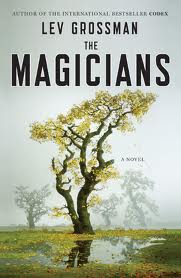The Magicians
by Lev Grossman
 I wasn’t bored by this book, for sure, but ultimately I wasn’t satisfied either. The cynical, disinterested view of the narrator, Quentin, pervades even the alternate magical world(s) he becomes privy to. There is a bit of wonder and awe at this new fantastic dimension to everyday life, but moreso there’s a grungy, apathetic feel to the whole book, that I was hoping would be resolved by the end and wasn’t. I don’t have a problem with drinking and sex on principle, or even drugs for the purposes of fiction, but they were present to such a degree that I got sick of it and of the characters engaging in such wasteful excess when, c’mon, they have magic to explore and be excited about! I felt more disgust and impatience with them to get over themselves and get on with life, than I did empathy for them.
I wasn’t bored by this book, for sure, but ultimately I wasn’t satisfied either. The cynical, disinterested view of the narrator, Quentin, pervades even the alternate magical world(s) he becomes privy to. There is a bit of wonder and awe at this new fantastic dimension to everyday life, but moreso there’s a grungy, apathetic feel to the whole book, that I was hoping would be resolved by the end and wasn’t. I don’t have a problem with drinking and sex on principle, or even drugs for the purposes of fiction, but they were present to such a degree that I got sick of it and of the characters engaging in such wasteful excess when, c’mon, they have magic to explore and be excited about! I felt more disgust and impatience with them to get over themselves and get on with life, than I did empathy for them.
I especially wanted to like Quentin, and at times did, but the usual story payoff of an antihero narrator changing/growing didn’t happen – he ends much like he began and behaved the entire book. He also ends much stronger in magical skill, which is something, but not stronger in any other area. Certainly not any stronger in regards to principles or personality. The most likable character, Alice, who may have had some chance of redeeming Quentin – well, I don’t want to give away any spoilers, but let’s just say that doesn’t happen and I was not happy with the direction her storyline ultimately took. The world Quentin falls in love with from childhood books, Fillory, comes off as a hollow mockery of established fantasy worlds like Narnia, which may have been intentional, but didn’t go over well with me.
Overall, I really was interested in the plot and the characters and the world of magic that Grossman portrayed, but a large part of my interest was in the hopes that they would prove worthy of devoting that much reading time to, and ultimately they didn’t. I closed the book with a memorably unsatisfied ‘hmph.’ If the intention was to parallel real world dissatisfaction and angst and ennui in magical fiction, it worked. But that’s not what I want or like to read – I am admittedly an escapist reader, and I want my reading ventures to be either pleasant or satisfying or both, and this was neither.
I will say, though, that the quality of the writing itself (voice, grammar, style, etc.) was very good. That alone isn’t enough to make me want to reread this book, or read any other of Grossman’s works, however.
I give it 2/5 stars.
A review over at Amazon says it really well:
“Definitely, the book had the makings of a great story. Yet, I was left numb at the end, not happy, not sad, not scared. And that, really, is why I left this review with 3 stars. I read fiction to be entertained. This entertainment can be in the form of humor, feeling good, scared, excited, titillated, insightful, or some combination thereof. Instead, when I read this book, I saw through the eyes of a fairly apathetic protagonist, who messes things up and blames everyone else, who had chances to become a hero and fails each time. I read about a person who wanted something, got it, didn’t like it, and became apathetic. I read about the antagonist being defeated, the protagonist winning in the end, and no one feeling … well, happy for having accomplished anything. Perhaps this is what real life can be. But come on, that’s not entertainment. And that’s what’s sad about this, that this book had the potential to be a GREAT story, but misses the mark significantly.” – Mitchell M. Tse










